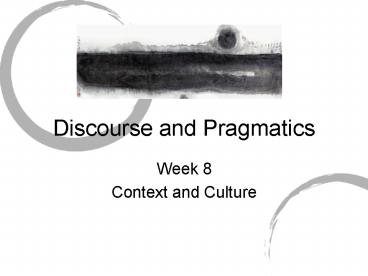Discourse and Pragmatics - PowerPoint PPT Presentation
1 / 25
Title:
Discourse and Pragmatics
Description:
Discourse and Pragmatics Week 8 ... situation What kinds of things people are supposed to say to whom in different situations Relationship to scripts Coherence ... – PowerPoint PPT presentation
Number of Views:392
Avg rating:3.0/5.0
Title: Discourse and Pragmatics
1
Discourse and Pragmatics
- Week 8
- Context and Culture
2
Text and Context
- People dont say what they mean
- People dont mean what they say
- How do we understand one another?
- Expectations about communication (Maxims)
- Expectations about sequencing (Adjacency Pairs)
- Co-text
3
Text and Context
- CONTEXT
- Expectations about the social situation
- What kinds of things people are supposed to say
to whom in different situations - Relationship to scripts
- Coherence
- Cultural Models
- What is a dim sum?
- What is a good boyfriend
4
The Ethnography of Speaking
- Noam Chomsky
- Competence vs. Performance
- (grammatical competence)
- Dell Hymes
- Communicative Competence
5
Hymes
Speech Situation
Speech Event
Speech Act
6
Speech Acts and Speech Events
Speech Event
Act
Act
Act
Act
7
Question
- What does a member of a community of practice
need to know to participate successfully in a
speech event? - What sort of communicative competence does s/he
need to have?
8
Task
- Ethnographic data
- Observation
- Interviews with informants
- Krumping
- Watch the video and discuss
- What members need to know to participate in this
speech event - How they learn it
- What kinds of behavior might mark one as a
non-member
9
- Theres a time for krumping and this isnt it.
10
Speaking
- Setting and Scene
- Participants
- Ends
- Act Sequence
- Key
- Instrumentalities
- Norms
- Genre
11
Setting and Scene
- Where the speech event is located in time and
space - "Setting refers to the time and place of a speech
act and, in general, to the physical
circumstances - Scene is the "psychological setting" or "cultural
definition" of a scene, including characteristics
such as range of formality and sense of play or
seriousness
12
Participants
- Who takes part and what role they play
- Discourse roles and social roles
- Ratified and Unratified participants
- Speaker and audience (addressees, hearers,
over-hearers, eavesdroppers
13
Ends
- Purpose or expected outcome
- Might be different for different participants
- Asking your boss for a promotion
- Going to the cinema
14
Act Sequence
- What acts (actions) are included and how they are
arranged sequentially
15
Key
- Tone, manner, mood, spirit and how it is
signalled or established - Linguistic, paralinguistic and non-verbal cues
16
Instrumentalities
- Channel, media, languages and language varieties
- Cultural tools
17
Norms of Interaction
- Rules governing how acts (actions) are produced
and interpreted - How participants are supposed to act and react
18
Genre
- What type (social category) does the speech event
belong to - What conventional forms are drawn upon
- Mixed genres, blurry genres
19
Speech Situation vs. Speech Event?
- Do the same rules of speaking apply throughout
the entire segment?
20
Analysis vs. Description
- What are the speech events that occur in this
community and what are their features? - Why do these speech events occur in this way?
- What is the social and cultural significance of
speaking in a certain way? - Making connections between speech events and
community organizations, practices, values - cookbook vs. heuristic
21
Examples
- Having a Kros
- Setting
- Participants
- Ends
- A Pentecostal Church Meeting (Cameron)
- Sequencing When to say hallelujah
- Members generalization vs. observation
- Implicit vs. explicit knowledge
- Participants?
- Setting?
- All components are to some extent discursively
constructed
22
Task
- Watch the clip from an Evangelical Church Camp
for children and apply the SPEAKING model to it - Discuss any difference between how you perceive
the event and how you think participants perceive
it
23
- Children speaking in tongues
- Faith Healing
24
The Ethnography of Writing
- Internet Forums/Blogs
- Graffiti
- Sky Writing
25
The Ethnography of Reading
- Reading as a public event
- Choral reading
- Notice reading
- Newspaper reading
- Book reading
- Technologically mediated reading
























![Pragmatics in practice [a pragmatic analysis of a Friends episode] PowerPoint PPT Presentation](https://s3.amazonaws.com/images.powershow.com/8284220.th0.jpg?_=20161129118)






